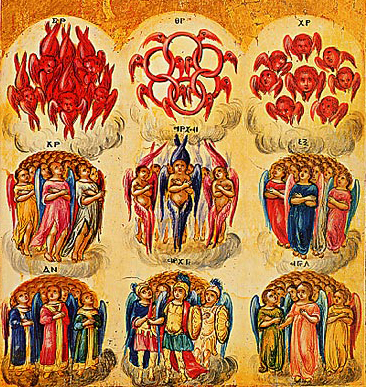Difference between revisions of "Template:Occult.live:Today's featured article"
Occultwiki (talk | contribs) |
Occultwiki (talk | contribs) |
||
| Line 1: | Line 1: | ||
[[File: | [[File:Choirs of Angels1.jpg|250px|left]] | ||
'''[[ | An '''[[angel]]''' is a supernatural spiritual being who, according to various religions, is God's servant. | ||
[[Abrahamic religion]]s often depict angels as benevolent celestial intermediaries between God (or Heaven) and humanity. Other roles include protectors and guides for humans, and servants of God. Abrahamic religions describe [[hierarchy of angels|angelic hierarchies]], which vary by religion and sect. Some angels have specific names (such as Gabriel or Michael) or titles (such as [[seraphim]] or [[powers]]). Those expelled from Heaven are called [[fallen angel]]s, distinct from the heavenly host. Angels in art are usually shaped like humans of extraordinary beauty. | |||
'''([[ | In [[Islam]], just like in [[Judaism]] and [[Christianity]], angels are often represented in anthropomorphic forms combined with supernatural images, such as wings, being of great size or wearing heavenly articles. The Quran describes them as "messengers with wings—two, or three, or four (pairs): He [God] adds to Creation as He pleases..." | ||
'''([[angel|Full Article...]])''' | |||
Revision as of 22:00, 22 March 2023
An angel is a supernatural spiritual being who, according to various religions, is God's servant.
Abrahamic religions often depict angels as benevolent celestial intermediaries between God (or Heaven) and humanity. Other roles include protectors and guides for humans, and servants of God. Abrahamic religions describe angelic hierarchies, which vary by religion and sect. Some angels have specific names (such as Gabriel or Michael) or titles (such as seraphim or powers). Those expelled from Heaven are called fallen angels, distinct from the heavenly host. Angels in art are usually shaped like humans of extraordinary beauty.
In Islam, just like in Judaism and Christianity, angels are often represented in anthropomorphic forms combined with supernatural images, such as wings, being of great size or wearing heavenly articles. The Quran describes them as "messengers with wings—two, or three, or four (pairs): He [God] adds to Creation as He pleases..."
